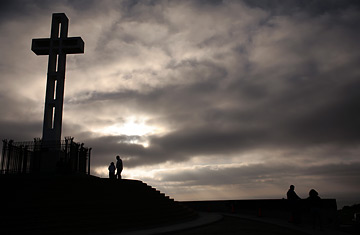
A 43-ft cross stands at the Mt. Soledad Veterans Memorial in San Diego.
(2 of 8)
Johannine Spirit.
Yet, along with the new atheism has come a new reformation The open-window spirit of Pope John XXIII and Vatican II have re vitalized the Roman Catholic Church.
Less spectacularly but not less decisively, Protestantism has been stirred by a flurry of experimentation in liturgy, church structure, ministry. In this new Christianity, the watchword is witness: Protestant faith now means not intellectual acceptance of an ancient confession, but open commitment—perhaps best symbolized in the U.S. by the civil rights movement—to eradicating the evil and inequality that beset the world.
The institutional strength of the churches is nowhere more apparent than in the U.S., a country where public faith in God seems to be as secure as it was in medieval France. According to a survey by Pollster Lou Harris last year, 97% of the American people say they believe in God. Although clergymen agree that the postwar religious revival is over, a big majority of believers continue to display their faith by joining churches. In 1964, reports the National Council of Churches, denominational allegiance rose about 2%, compared with a population gain of less than 1.5%. More than 120 million Americans now claim a religious affiliation; and a recent Gallup survey indicated that 44% of them report that they attend church services weekly.
For uncounted millions, faith remains as rock-solid as Gibraltar. Evangelist Billy Graham is one of them. "I know that God exists because of my personal experience," he says. "I know that I know him. I've talked with him and walked with him. He cares about me and acts in my everyday life." Still another is Roman Catholic Playwright William Alfred, whose off-Broadway hit, Hogan's Goat, melodramatically plots a turn-of-the-century Irish immigrant's struggle to achieve the American dream. "People who tell me there is no God," he says, "are like a six-year-old boy saying that there is no such thing as passionate love—they just haven't experienced it."
Practical Atheists.
Plenty of clergymen, nonetheless, have qualms about the quality and character of contemporary belief. Lutheran Church Historian Martin Marty argues that all too many pews are filled on Sunday with practical atheists—disguised nonbelievers who behave during the rest of the week as if God did not exist. Jesuit Murray qualifies his conviction that the U.S. is basically a God-fearing nation by adding: "The great American proposition is 'religion is good for the kids, though I'm not religious myself.' " Pollster Harris bears him out: of the 97% who said they believed in God, only 27% declared themselves deeply religious.
Christianity and Judaism have always had more than their share of men of little faith or none. "The fool says in his heart, 'there is no God,' " wrote the Psalmist, implying that there were plenty of such fools to be found in ancient Judea. But it is not faintness of spirit that the churches worry about now: it is doubt and bewilderment assailing committed believers.
Particularly among the young, there is an acute feeling that the churches on Sunday are preaching the existence of a God who is nowhere visible in their daily lives. "I love God," cries one anguished teenager, "but I hate the church." Theologian Gilkey says that "belief is the area in the modern Protestant church where one finds blankness, silence, people not knowing what to say or merely repeating what their preachers say." Part of the Christian mood today, suggests Christian Atheist William Hamilton, is that faith has become not a possession but a hope.
Anonymous Christianity. In search of meaning, some believers have desperately turned to psychiatry, Zen or drugs. Thousands of others have quietly abandoned all but token allegiance to the churches, surrendering themselves to a life of "anonymous Christianity" dedicated to civil rights or the Peace Corps. Speaking for a generation of young Roman Catholics for whom the dogmas of the church have lost much of their power, Philosopher Michael Novak of Stanford writes: "I do not understand God, nor the way in which he works. If, occasionally, I raise my heart in prayer, it is to no God I can see, or hear, or feel. It is to a God in as cold and obscure a polar night as any non-believer has known."
